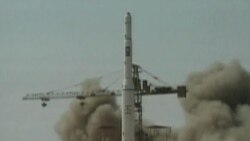PENTAGON —
The Pentagon is warning North Korea to stop its provocative actions after Pyongyang threatened a preemptive nuclear strike against the United States. Defense Department officials say that despite the North’s successful nuclear tests, they doubt it is able to deliver on its threats.
Bellicose threats from North Korea are nothing new, but this is the first time Pyongyang has threatened a direct nuclear hit on the United States.
The threat comes in response to new U. N. sanctions supported by the U.S., its allies and China -- after Pyongyang conducted its third nuclear test last month.
"The resolution tabled today will take the U.N. sanctions imposed on North Korea to the next level, breaking new ground and imposing significant new legal obligations," said U.S. U.N. Ambassador Susan Rice.
It is also a reaction to U.S. and South Korean joint naval exercises that the U.S. says are routine, but which the North claims are preparations for a U.S. nuclear attack.
“This one is more precise and perhaps more hysterical than most previous threats coming out of North Korea. What’s changed is that the context is a bit different this time. North Korea has edged closer to a nuclear-tipped missile capability," said Patrick Cronin, a security analyst with the Center for a New American Security in Washington.
North Korea’s three-stage rocket launch in December and a successful nuclear test in February are reasons for U.S. officials to take the threats seriously.
Pyongyang has made good on some of its lethal threats in the past. In 2010, it launched an artillery attack that killed soldiers and civilians on the South Korean island of Yongpyeong. That same year, a North Korean torpedo sank a South Korean navy ship, killing 46 sailors.
Analysts say that by threatening nuclear war, new leader Kim Jong Un is trying to prevent the United States and its allies from responding to North Korean provocations. They say his resolve for an all-out nuclear war with the United States is doubtful.
“That’s the calculus that’s going on here. It’s not actually about war. It’s about North Korean advantage in an asymmetrical situation where they’re outgunned by the outside powers,” Cronin said.
Although the North Koreans have tested individual components of a nuclear missile system, they have yet to show they have the capability to deliver a nuclear bomb.
The U.S. Defense Department, in warning the North against further provocative actions, has sent a reminder to Pyongyang that it is firmly committed to defend South Korea, where 28,000 American troops and the vessels of the U.S. Navy’s Seventh Fleet stand ready.
Bellicose threats from North Korea are nothing new, but this is the first time Pyongyang has threatened a direct nuclear hit on the United States.
The threat comes in response to new U. N. sanctions supported by the U.S., its allies and China -- after Pyongyang conducted its third nuclear test last month.
"The resolution tabled today will take the U.N. sanctions imposed on North Korea to the next level, breaking new ground and imposing significant new legal obligations," said U.S. U.N. Ambassador Susan Rice.
It is also a reaction to U.S. and South Korean joint naval exercises that the U.S. says are routine, but which the North claims are preparations for a U.S. nuclear attack.
“This one is more precise and perhaps more hysterical than most previous threats coming out of North Korea. What’s changed is that the context is a bit different this time. North Korea has edged closer to a nuclear-tipped missile capability," said Patrick Cronin, a security analyst with the Center for a New American Security in Washington.
North Korea’s three-stage rocket launch in December and a successful nuclear test in February are reasons for U.S. officials to take the threats seriously.
Pyongyang has made good on some of its lethal threats in the past. In 2010, it launched an artillery attack that killed soldiers and civilians on the South Korean island of Yongpyeong. That same year, a North Korean torpedo sank a South Korean navy ship, killing 46 sailors.
Analysts say that by threatening nuclear war, new leader Kim Jong Un is trying to prevent the United States and its allies from responding to North Korean provocations. They say his resolve for an all-out nuclear war with the United States is doubtful.
“That’s the calculus that’s going on here. It’s not actually about war. It’s about North Korean advantage in an asymmetrical situation where they’re outgunned by the outside powers,” Cronin said.
Although the North Koreans have tested individual components of a nuclear missile system, they have yet to show they have the capability to deliver a nuclear bomb.
The U.S. Defense Department, in warning the North against further provocative actions, has sent a reminder to Pyongyang that it is firmly committed to defend South Korea, where 28,000 American troops and the vessels of the U.S. Navy’s Seventh Fleet stand ready.





